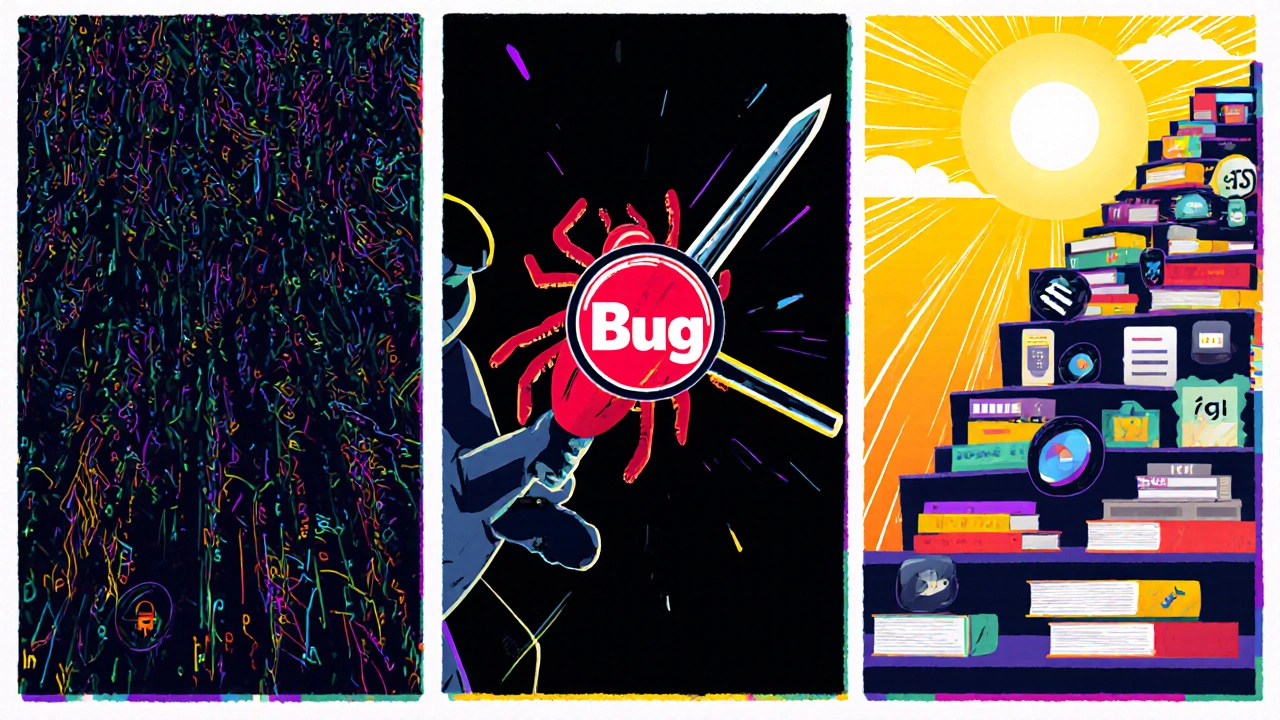Is Coding a Tough Job? Facts, Myths, and How to Thrive
 Oct, 3 2025
Oct, 3 2025
Coding Job Difficulty Calculator
This tool estimates how challenging a coding job might be based on several key factors. Adjust the sliders below to reflect your situation:
Estimated Difficulty Level
Coding Job is a profession that involves writing, testing, and maintaining software code. People often ask whether it’s a tough gig, and the answer isn’t a simple yes or no. Below you’ll find the real factors that make coding demanding, the myths that exaggerate the pain, and practical steps to turn the challenge into a rewarding career.
TL;DR - Quick Takeaways
- Coding can be demanding, but difficulty varies by role, experience, and support system.
- Core challenges include steep learning curves, constant problem‑solving, and occasional burnout.
- Strong fundamentals, good habits, and realistic expectations make the job manageable.
- Remote work and high salaries often offset the stress for many developers.
- Continuous learning is a career‑long requirement, not a one‑time hurdle.
What Makes a Coding Job Tough?
First, let’s break down the three pillars that most people point to when they say "coding is hard":
- Technical Complexity - mastering algorithms, data structures, and language syntax.
- Problem‑Solving Pressure - debugging mysterious bugs and delivering features on tight deadlines.
- Continuous Learning - staying current with constantly evolving frameworks and tools.
Each pillar adds a layer of difficulty, but the impact differs based on the type of Software Developer someone who designs, builds, and maintains applications you are.
Technical Complexity - The Language Barrier
When you start, Programming Language a formal set of instructions used to create software choices can feel overwhelming. Python’s simple syntax may look friendly, while C++ demands understanding of memory management. The learning curve (yes, it’s an actual term) can be steep: a 2023 Stack Overflow survey reported that beginners spend an average of 6 months to feel comfortable with their first language.
Choosing a language that aligns with your career goals reduces the perceived difficulty. For example, if you aim for data science, Python or R are natural fits; for system‑level work, C or Rust make sense.
Problem‑Solving Pressure - Debugging and Deadlines
Every line of code is a hypothesis: it will work, or it won’t. Debugging the process of identifying, isolating, and fixing bugs in software is where the rubber meets the road. A classic story involves a missing semicolon that brings an entire production system down - a nightmare for many novices.
Deadlines amplify this stress. Agile sprints, client expectations, and release cycles mean you often have limited time to solve complex problems. However, good version‑control practices and automated testing can soften the blow.
Continuous Learning - The Never‑Ending Curriculum
Tech evolves at breakneck speed. In 2024, the rise of AI‑assisted coding tools like GitHub Copilot changed how developers write code, but also added a new skill set: prompt engineering. The Learning Curve the rate at which a person acquires new skills for new tools can be steep, especially if you’re juggling a full‑time job.
Think of learning as a marathon, not a sprint. Setting aside a few hours each week for courses, blogs, or open‑source contributions pays off in the long run.
Work Environment - Remote vs On‑Site
Where you work matters. Remote Remote Work a work arrangement that allows employees to perform duties outside of a traditional office can reduce commute stress and give you flexibility, but it also blurs the line between personal and professional time, sometimes leading to longer hours.
On‑site teams benefit from face‑to‑face collaboration, which can speed up problem solving. The choice often depends on personal preference and company culture.

Compensation vs Stress - Is the Pay Worth It?
One clear advantage of a Salary the monetary compensation received for work performed in coding is that it often outpaces many other fields. According to the 2025 US Bureau of Labor Statistics, the median annual salary for software developers is $115,000, with senior roles reaching $160,000+
Higher pay can offset stress, but only if you manage work‑life balance. Burnout rates among developers hover around 30%, per a 2024 IEEE study, indicating that money alone isn’t a cure.
Burnout - The Silent Threat
Burnout a state of physical, emotional, and mental exhaustion caused by prolonged stress manifests as loss of motivation, chronic fatigue, and declining code quality. Common triggers include unrealistic timelines, endless debugging sessions, and lack of mentorship.
Preventive measures are simple: regular breaks, realistic sprint planning, and a supportive team culture. Companies that invest in mental‑health resources see up to 20% lower turnover among engineers.
Practical Tips to Make Coding Less Tough
- Start with a focused language. Master one language before hopping to another.
- Pair program. Learning alongside a peer accelerates debugging skills.
- Automate testing. Unit tests catch errors early, reducing stressful fix‑later cycles.
- Set boundaries. Define work hours, especially when remote.
- Invest in continuous learning. Allocate weekly time for tutorials or open‑source.
By treating challenges as solvable puzzles rather than insurmountable walls, you’ll find the job far more enjoyable. After all, many developers describe the “aha!” moment of fixing a bug as the most satisfying part of the work.
Comparison Table - Coding Job vs Other Tech Roles
| Role | Typical Tasks | Core Skills | Average Salary (US) | Stress Level |
|---|---|---|---|---|
| Coding Job | Write, test, maintain code | Programming, debugging, algorithms | $115,000 | High |
| Data Analyst | Analyze datasets, build dashboards | SQL, statistics, visualization | $85,000 | Medium |
| IT Support | Resolve hardware/software issues | Networking, troubleshooting | $55,000 | Low‑Medium |
When Coding Might Feel Too Tough
If you’re constantly stuck, missing deadlines, or feeling drained despite taking breaks, it may be a sign that the role or environment isn’t a good fit. Consider switching to a role with more user‑interface work, or a company that emphasizes mentorship.
Remember, the difficulty of a coding job is often a function of external factors-team support, tooling, and realistic expectations-rather than a personal flaw.
Final Thought
So, is coding a tough job? Yes, it can be, but the level of toughness is highly controllable. By choosing the right language, fostering solid problem‑solving habits, and protecting your mental health, you can turn the challenges into a rewarding career. Embrace the learning curve, lean on community resources, and keep your eye on the bigger picture: building tools that make other people’s lives easier.
When you approach the work with curiosity rather than dread, the coding job becomes less a hurdle and more a playground.
Frequently Asked Questions
Do I need a computer science degree to handle a coding job?
No. Many successful developers are self‑taught or come from bootcamps. What matters most is a solid portfolio, problem‑solving ability, and continuous learning.
How long does it typically take to become comfortable with a programming language?
For most people, 3‑6 months of consistent practice (1‑2 hours daily) leads to basic proficiency. Mastery can take years and depends on project complexity.
Is remote work more stressful than office work for developers?
It varies. Remote work eliminates commute and offers flexibility, but can blur work‑life boundaries. Setting clear hours and a dedicated workspace helps reduce stress.
What are the warning signs of burnout in a coding career?
Persistent fatigue, loss of enthusiasm for coding, frequent irritability, and declining code quality are key indicators. If you notice these, consider taking a break or speaking with a manager.
Can I switch from a non‑technical background to a coding job?
Absolutely. Many transition from fields like finance, design, or humanities. Start with a beginner‑friendly language, build a portfolio, and leverage networking or mentorship programs.